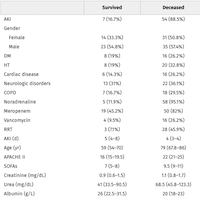Fluid overload, de-resuscitation, and outcomes in critically ill or injured patients
linkis.com
Sepsis is associated with generalised endothelial injury and capillary leak and has traditionally been treated with large volume fluid resuscitation. Some patients with sepsis will accumulate bodily fluids. The aim of this study was to systematically review the association between a positive fluid balance/fluid overload and outcomes in critically ill adults, and to determine whether interventions aimed at reducing fluid balance may be linked with improved outcomes.
A positive cumulative fluid balance is associated with IAH and worse outcomes. Interventions to limit the development of a positive cumulative fluid balance are associated with improved outcomes. In patients not transgressing spontaneously from the Ebb to Flow phases of shock, late conservative fluid management and late goal directed fluid removal (de-resuscitation) should be considered.















